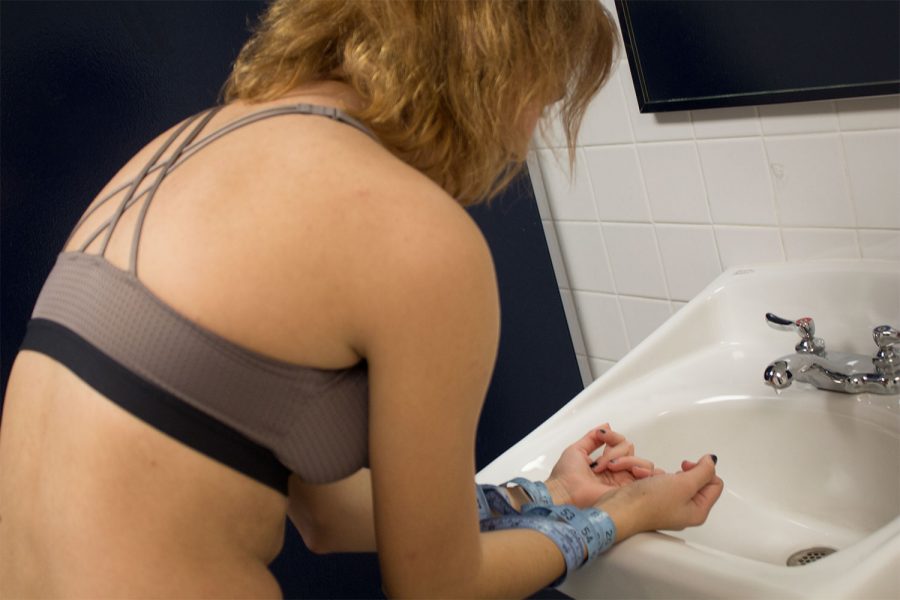Your donation will support the student journalists of Francis Howell Central High School. Your contribution will allow us to purchase equipment and cover our annual website hosting costs. FHCToday.com and our subsequent publications are dedicated to the students by the students. We hope you consider donating to allow us to continue our mission of a connected and well-informed student body.
Photo Illustrations by Kayla Reyes
A teenage girl stands hunched over a sink and looks into a mirror, her hands bound with pastel-blue tape measures. Those affected by by eating disorders often feel disgusted within their own bodies, and turn to unhealthy tactics to “fix” themselves.
The Road To Recovery
The steps in recovering from an eating disorder require intense thought and dedication
November 18, 2019
“Today I am a good weight for my height and happy in my own skin,” sophomore Emma Cowherd said in regards to her struggles with an eating disorder.
Cowherd began engaging in poor eating habits in seventh grade and went on the downhill slope towards her eating disorder.
“It started with me not feeling hungry, but then I started to see a difference and I liked how I was getting skinnier… I thought I looked better,” Cowherd said.
Cowherd, like several other high school students, notice that there is a pressure in our society to look a certain way. Skinny waist, thin legs, toned arms. Unfortunately, some of us conform to this thought process and undergo unhealthy habits to achieve an unhealthy goal.
Whether someone has struggled with an eating disorder or is struggling with an eating disorder, the most important part of it all is recovery.
Recovery is obviously not easy. According to the Eating Recovery Center, the highest risk for relapse is in the first 18 months after treatment. With relapse around the corner for some who are recovering, it takes will power and determination to stay on track to success.
According to the National Eating Disorder Organization, recovery takes five steps: pre-contemplation, contemplation, preparation, action, and maintenance (or relapse).
It all begins with “pre-contemplation.” This step normally includes friends and/or family approaching someone about their eating habits. At this step, the affected individual doesn’t acknowledge the problem. Sophomore Lexi Lyons described her experience fitting this mold.
“My mom noticed and then she brought it to my attention … at first I didn’t think anything of it,” Lyons said.
For Cowherd, pre-contemplation also began with her mother.
“My mom started getting concerned when I didn’t eat dinner,” Cowherd said.
After being approached by friends and family, the “contemplation” stage sets in. Lyons began to notice what her friends and family were worried about. Recovery was beginning to be a thought worth thinking about.
“Seeing myself so small after not being that small for a really long time upset me. Really upset me. And then, I just looked at myself and I was like, ‘You’re so skinny to where its gross.’ I don’t know. It really upset me,” Lyons said.
Following these contemplative thoughts, “preparation” began. Once someone decides they need to seek help, determining how is always a difficult choice. Do they approach a parent? A friend? A counselor, or an eating disorder professional?
For most, treatment is full of unexpected barriers and obstacles. The sheer fact that these individuals will have to change a habit they have developed over time is hard as it is, but then adding on to their worries is all the questions they have. Where do I find treatment? What will treatment look like? How can I open up about my issues? All of the unexpected must be addressed first before any action can take place to ensure safety.
Once all questions are asked and answered by doctors, friends and trusted adults, “action” can finally begin.
For Lyons, action began with a doctors appointment. Being able to put a label on the habits she was forming helped her learn how to treat them.
For Cowherd, action began with her mother. Approaching someone you care about to an incomprehensible degree is understandably difficult. No one said the steps towards recovery was easy.
“Anybody who is dealing with it; It sucks. And I wish the best of luck to anybody who is dealing with the same problems,” Lyons said.
And then, we reach the hardest step; maintenance. This step is the hardest because there are so many ways in which it can go wrong.
“I am getting [to recovery] and I think I am on a track to where I wont relapse as easily,” Lyons said.
I am getting [to recovery] and I think I am on a track to where I wont relapse as easily. — Lexi Lyons
But not everyone is as lucky. For anorexia and bulimia specifically, relapse rates are between 35 and 36 percent. According to the Eating Recovery Center, relapse typically spawns from poor body image, poor social relationships, slow results from treatment, and lack of motivation to recover during and after treatment.
“The biggest challenge was convincing myself that im not getting fat. It was convincing myself that I’m getting healthy. That’s definitely the hardest part,” Lyons said.
Cowherd went through recovery and is healthier now. Cowherd was able to catch herself at an early stage, which made for a speedier recovery.
“Recovery is different for a lot of people. For me it wasn’t the hardest thing but it’s different for a lot of people and just know if you’re in the process of recovering, you can do it and believe in yourself,” Cowherd said.
The further along one is in their eating disorder, the harder recovery is; the more one has to backtrack. But along the way, there are several resources available to help.
(insert all resources)
“It doesn’t matter what other people think. Get yourself to where you’re happy and healthy,” Lyons said.
“Some advice I would give is that I know how difficult it is but you are worth more than your disorder,” Cowherd said.

